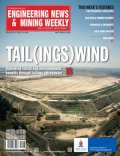The future of work in a digital world
This article has been supplied as a media statement and is not written by Creamer Media. It may be available only for a limited time on this website.
By Cathy Smith, Managing Director at SAP Africa
The digital age, and the new technologies it’s brought with it - blockchain, artificial intelligence (AI), robotics, augmented reality and virtual reality - is seen by many as a threat to our way of life as we know it. What if my job gets automated? How will I stay relevant? How do we adapt to the need for new skills to manage customer expectations and the flood of data that’s washing over us?
The bad news is that the nature of work has already changed irrevocably. Everything that can be automated, will be. We already live in an age of “robot restaurants”, where you order on a touch screen, and machines cook and serve your food.
Did you notice the difference? AmazonGo is providing shopping without checkout lines. In the US alone, there are an estimated 3.4 million drivers that could be replaced by self-driving vehicles in 10 years, including truck drivers, taxi drivers and bus drivers.
We’re not immune from this phenomenon in Africa. In fact, the World Economic Forum (WEF) predicts that 41% of all work activities in South Africa are susceptible to automation, compared to 44% in Ethiopia, 46% in Nigeria and 52% in Kenya. This doesn’t mean millions of jobs on the continent will be automated overnight, but it’s a clear indicator of the future direction we’re taking.
The good news is that we don’t need to panic. What’s important for us in South Africa, and the continent, is to realise that there is plenty of work that only humans can do. This is particularly relevant to the African context, as the working-age population rises to 600 million in 2030 from 370 million in 2010. We have a groundswell of young people who need jobs – and the digital age has the ability to provide them, if we start working now.
Make no mistake, there’s no doubt that this so-called “Fourth Industrial Revolution” is going to disrupt many occupations. This is perfectly natural: every Industrial Revolution has made some jobs redundant. At the same time, these Revolutions have created vast new opportunities that have taken us forward exponentially.
Between 2012 and 2017, for example, it’s estimated that the demand for data analysts globally grew by 372%, and the demand for data visualisation skills by more than 2000%. As businesses, this means we have to not only create new jobs in areas like data science and analytics, but reskill our existing workforces to deal with the digital revolution and its new demands.
So, while bus drivers and data clerks are looking over their shoulders nervously right now, we’re seeing a vast range of new jobs being created in fields such as STEM (Science, Technology, Engineering and Mathematics), data analysis, computer science and engineering.
This is a challenge for Sub-Saharan Africa, where our levels of STEM education are still not where they should be. That doesn’t mean there are no opportunities to be had. In the region, for example, we have a real opportunity to create a new generation of home-grown African digital creators, designers and makers, not just “digital deliverers”. People who understand African nuances and stories, and who not only speak local languages, but are fluent in digital.
This ability to bridge the digital and physical worlds, as it were, will be the new gold for Africa. We need more business operations data analysts, who combine deep knowledge of their industry with the latest analytical tools to adapt business strategies. There will also be more demand for user interface experts, who can facilitate seamless human-machine interaction.
Of course, in the longer term, we in Africa are going to have to make some fundamental decisions about how we educate people if we’re going to be a part of this brave new world. Governments, big business and civil society will all have roles to play in creating more future-ready education systems, including expanded access to early-childhood education, more skilled teachers, investments in digital fluency and ICT literacy skills, and providing robust technical and vocational education and training (TVET). This will take significant intent not only from a policy point of view, but also the financial means to fund this.
None of this will happen overnight. So what can we, as individuals and businesspeople, do in the meantime? A good start would be to realise that the old models of learning and work are broken. Jenny Dearborn, SAP’s Global Head of Learning, talks about how the old approach to learning and work was generally a three-stage life that consisted largely of learn-work-retire.
Today, we live in what Ms Dearborn calls the multi-stage life, which includes numerous phases of learn-work-change-learn-work. And where before, the learning was often by rote, because information was finite, learning now is all about critical thinking, complex problem-solving, creativity and innovation and even the ability to un-learn what you have learned before.
Helping instill this culture of lifelong learning, including the provision of adult training and upskilling infrastructure, is something that all companies can do, starting now. The research is clear: even if jobs are stable or growing, they are going through major changes to their skills profile. WEF’s Future of Jobs analysis found that, in South Africa alone, 39% of core skills required across all occupations will be different by 2020 compared to what was needed to perform those roles in 2015.
This is a huge wake-up call to companies to invest meaningfully in on-the-job training to keep their people – and themselves – relevant in this new digital age. There’s no doubt that more learning will need to take place in the workplace, and greater private sector involvement is needed. As employers, we have to start working closely with should therefore offer schools, universities and even non-formal education to provide learning opportunities to our workers.
We can also drive a far stronger focus on the so-called “soft skills”, which is often used as a slightly dismissive term in the workplace. The core skills needed in today’s workplace are active listening, speaking, and critical thinking.
A quick look at the WEF’s “21st Century Skills Required For The Future Of Work” chart bears this out: as much as we need literacy, numeracy and IT skills to make sense of the modern world of work, we also need innately human skills like communication and collaboration. The good news is that not only can these be taught – but they can be taught within the work environment.
It sounds almost counter-intuitive, but to be successful in the Digital Age, businesses are going to have to go back to what has always made them strong: their people. Everyone can buy AI, build data warehouses, and automate every process in sight. The companies that will stand out will be those that that focus on the things that can’t be duplicated by AI or machine learning - uniquely human skills.
I have no doubt that the future will not be humans OR robots: it will be humans AND robots, working side by side. For us, as businesspeople and children of the African continent, we’re on the brink of a major opportunity. We just have to grasp it.
Comments
Press Office
Announcements
What's On
Subscribe to improve your user experience...
Option 1 (equivalent of R125 a month):
Receive a weekly copy of Creamer Media's Engineering News & Mining Weekly magazine
(print copy for those in South Africa and e-magazine for those outside of South Africa)
Receive daily email newsletters
Access to full search results
Access archive of magazine back copies
Access to Projects in Progress
Access to ONE Research Report of your choice in PDF format
Option 2 (equivalent of R375 a month):
All benefits from Option 1
PLUS
Access to Creamer Media's Research Channel Africa for ALL Research Reports, in PDF format, on various industrial and mining sectors
including Electricity; Water; Energy Transition; Hydrogen; Roads, Rail and Ports; Coal; Gold; Platinum; Battery Metals; etc.
Already a subscriber?
Forgotten your password?
Receive weekly copy of Creamer Media's Engineering News & Mining Weekly magazine (print copy for those in South Africa and e-magazine for those outside of South Africa)
➕
Recieve daily email newsletters
➕
Access to full search results
➕
Access archive of magazine back copies
➕
Access to Projects in Progress
➕
Access to ONE Research Report of your choice in PDF format
RESEARCH CHANNEL AFRICA
R4500 (equivalent of R375 a month)
SUBSCRIBEAll benefits from Option 1
➕
Access to Creamer Media's Research Channel Africa for ALL Research Reports on various industrial and mining sectors, in PDF format, including on:
Electricity
➕
Water
➕
Energy Transition
➕
Hydrogen
➕
Roads, Rail and Ports
➕
Coal
➕
Gold
➕
Platinum
➕
Battery Metals
➕
etc.
Receive all benefits from Option 1 or Option 2 delivered to numerous people at your company
➕
Multiple User names and Passwords for simultaneous log-ins
➕
Intranet integration access to all in your organisation























